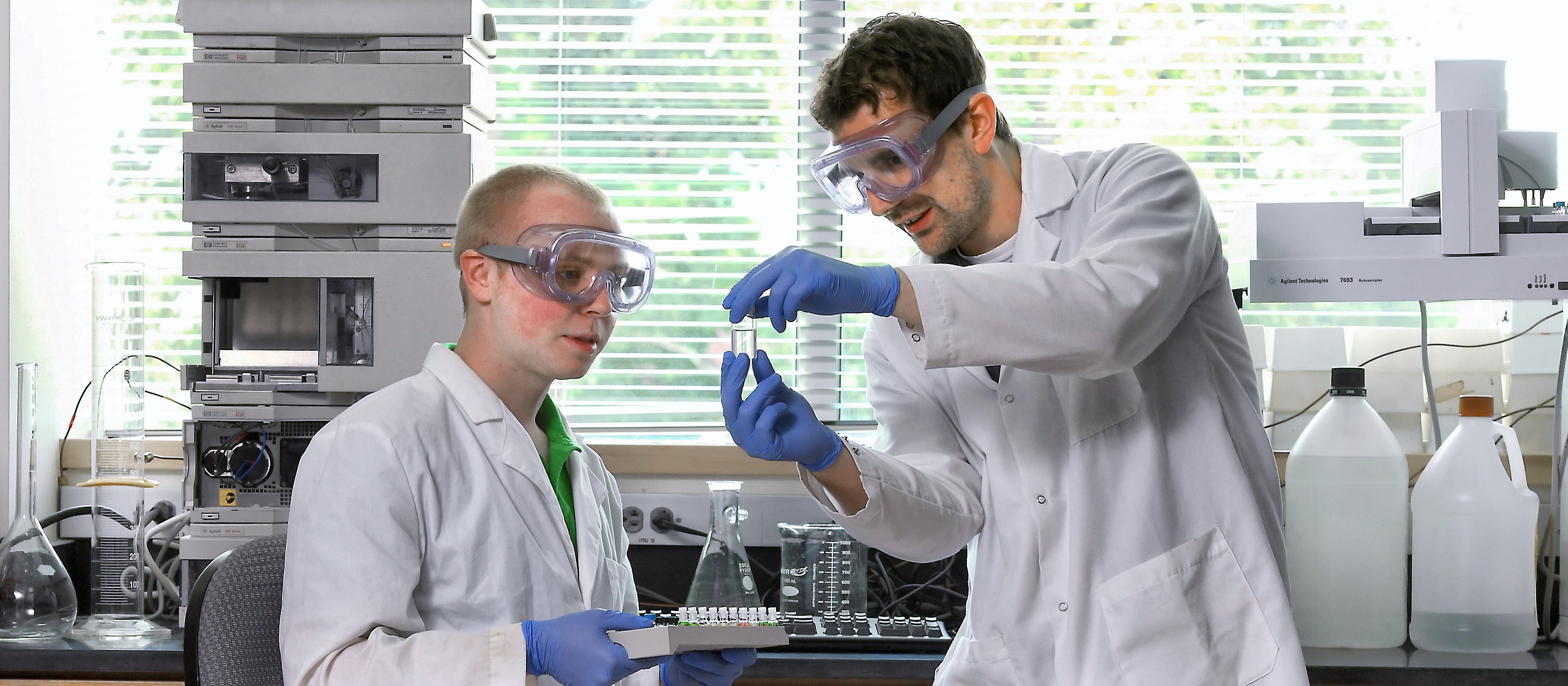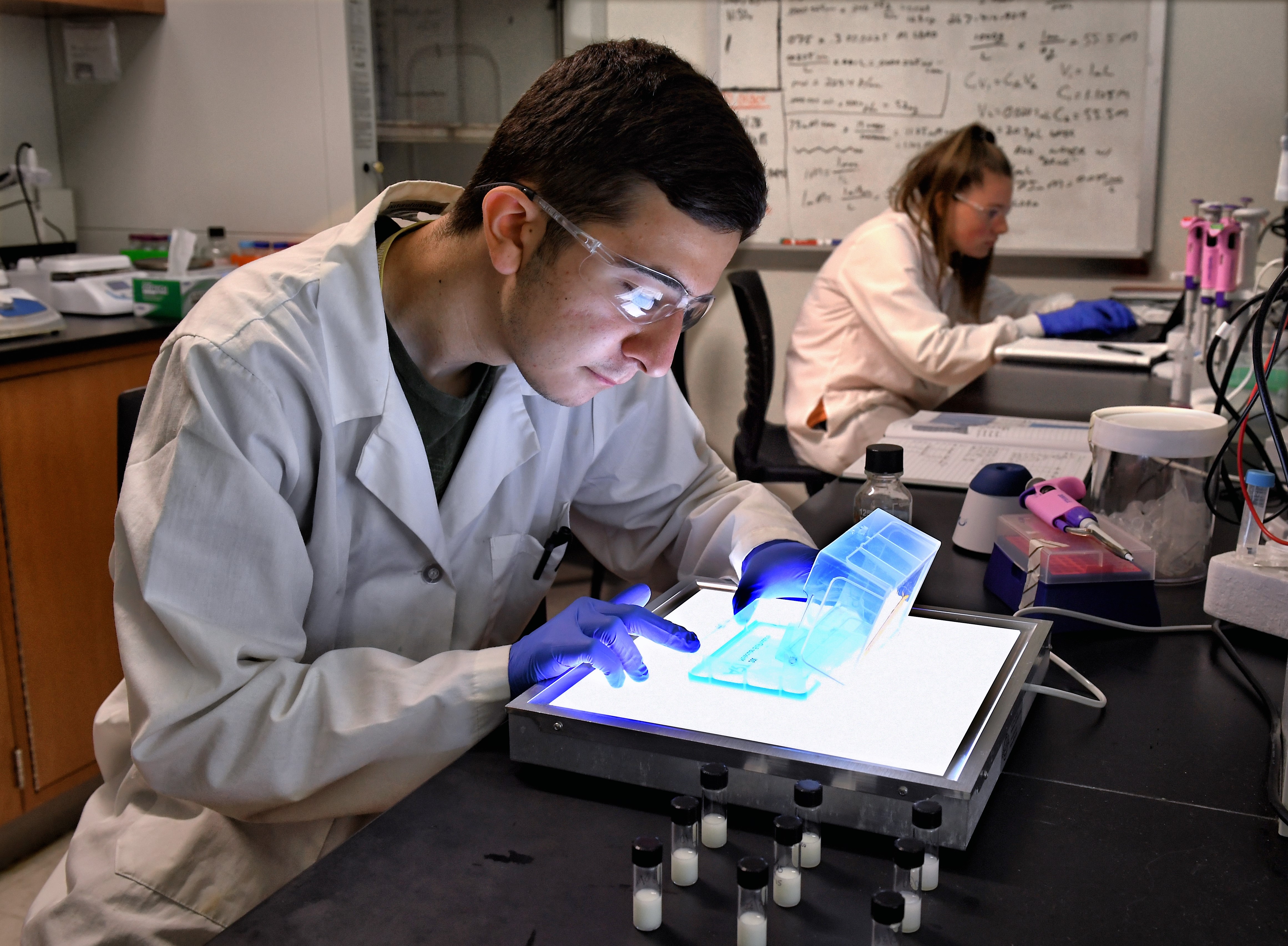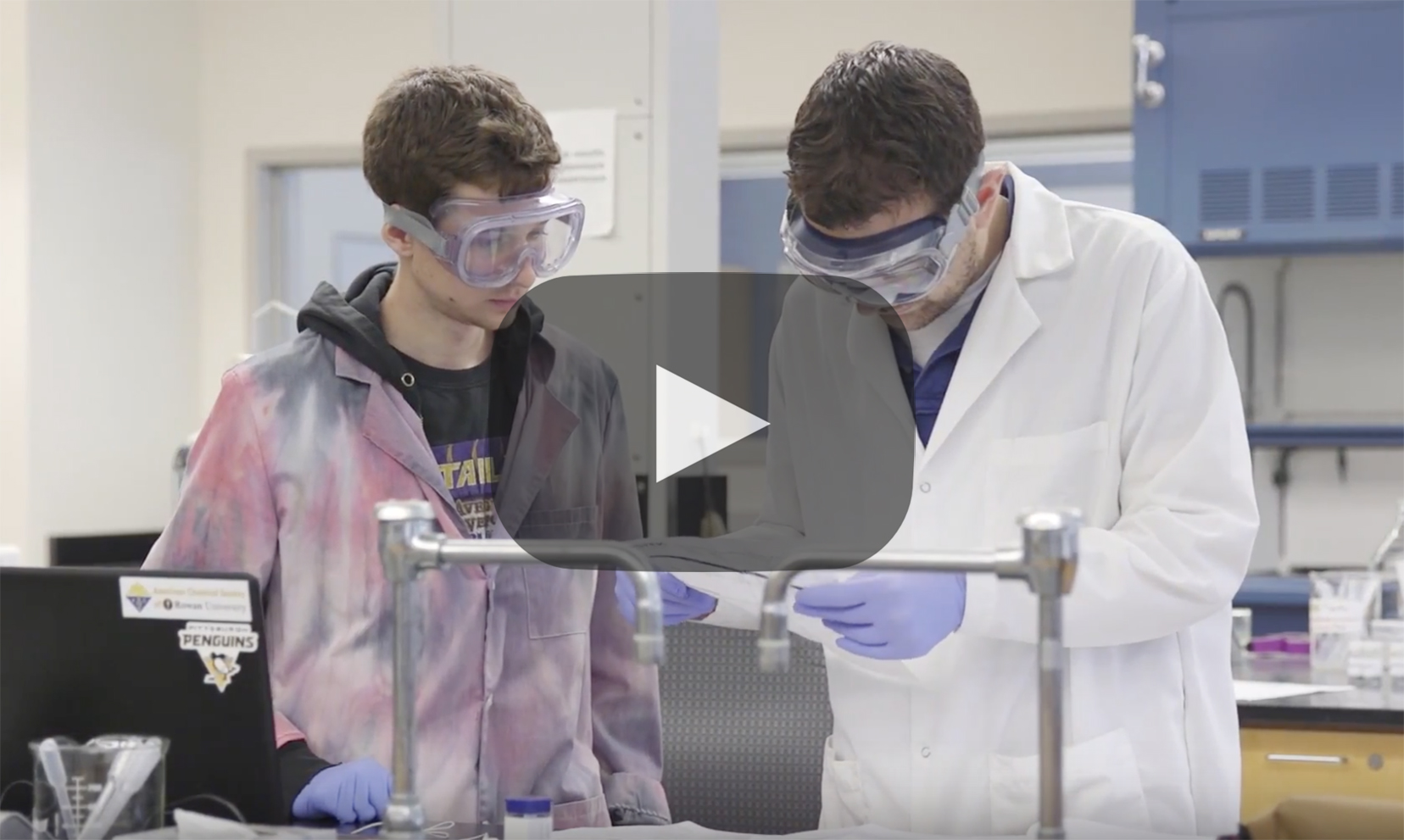Summer of science: More than 100 students conduct cutting-edge research in College of Science & Mathematics
Summer of science: More than 100 students conduct cutting-edge research in College of Science & Mathematics
The table screamed.
Not literally, of course, but the pneumatic laser table, floating on legs that were cushions of air, emitted a warning sound when someone touched it more than slightly.
The table – equipped with sophisticated computer and laser equipment that jostling can compromise – is in the lab of Dr. Nathaniel Nucci, an assistant professor of physics and astronomy and of molecular cellular biosciences in the College of Science & Mathematics (CSM) at Rowan University.
100+ student researchers
That lab was one of the sites where some of more than 100 students conducted research in CSM’s and the School of Health Professions’ Summer Undergraduate Research Program (SURP) this May through July.
Three students in Nucci’s labs, which focus on molecular biophysics and understanding how life works at the molecular level, worked on two main projects. One was on protein structures and how they relate to their functions, with the goal of enabling researchers to do a better job developing and delivering drugs. The other was on the movement of molecules in cell-like systems, with the aim of predicting how the molecules will react in solutions and impact drug delivery.
If the work sounds high end, it is.
Cutting-edge work
SURP, now in its fourth year, provided a diverse cohort of Rowan undergraduate students, including those from groups underrepresented in the sciences, with the opportunity to conduct cutting-edge research under experienced professors while also sharing in mentoring and community-building activities.
Dr. Karen Magee-Sauer, dean, founded SURP and implemented it with more than $300,000 in funding from a NASA Space Grant (matched with Rowan funds), department budgets, faculty start-ups and faculty grants. More than 35 professors in eight departments worked with the students in labs in Science, Robinson and James halls on the Glassboro campus. SURP paid students a $3,750 stipend for the 10 weeks they participated.
The research in the highly competitive program is important to further science. It’s also important for the students.

Preparing for grad school, work force
“All undergraduates who want to go to graduate school now are expected to come in with significant undergraduate research and even peer-reviewed publications as an undergraduate author. SURP provides meaningful research opportunities for students, and with SURP on their records Rowan students are being accepted into top graduate programs,” Magee-Sauer said. “Also, for those not going to graduate school, doing research gives them the critical professional skills that employers are looking for, and many of these are only developed outside of the classroom.”
She added, “When I came to the dean’s office four years ago, we had been doing this on a smaller scale just for the Physics Department. I saw how successful it was and how it helped students get accepted into highly regarded graduate programs and to be hired by industry. Working on a project really helped give them real-world experience that both employers and grad schools are looking for.”
In Nucci’s lab, the additional research experience was just what Joseph Iovine, 21, wanted. The rising senior biochemistry major from Demarest, New Jersey – like his contemporaries dressed in casual clothes and sneakers under white lab coats on a recent summer day – worked in Nucci’s lab in his first SURP experience. He not only gained experience, however. He also mentored. “Passing knowledge on to others, helping other undergraduates on their projects is most meaningful,” said Iovine, who plans to pursue a Ph.D. and work in biotechnology in the private sector.
Dr. James Grinias, an assistant professor of chemistry and biochemistry, had three students work with him on three projects: developing a chemical analysis system to evaluate sugars extracted from biomasses such as grass and wood chips using liquid chromatography (LC), developing an LC control system using microelectronics to analyze materials’ composition, and using 3D printing to develop miniature analytical devices to process small chemical samples.
Comparable to industry

“The techniques and instruments that these students used are identical to the ones used in the pharmaceutical industry and other testing facilities worldwide, giving them real-world experience as analytical chemists,” said Grinias.
Sam Foster, 19, a rising junior chemistry major from Hackettstown, New Jersey, saw SURP as a continuation of his academic-year research. “I’d been doing research throughout the semester, and I wanted to continue it through the summer. SURP made it really, really easy to do that,” said Foster, who already has presented some preliminary research at the Chromatography Forum of the Delaware Valley, from which he earned a second place for his work.
Foster, who wants to earn a Ph.D. in chemistry and become a professor, sees the future in the work. “We’re in the final stages of our testing to finish a project so we can get published,” he said. “It’s a huge leap forward. It will allow us to share our work with others in the field.”
Evan Burdsall, 21, a rising senior physics major from Bridgeton, New Jersey, also worked in Nucci’s lab and found the experience valuable.
Learning to innovate
“You’re working on problems that aren’t already solved as opposed to reading about solutions in a textbook. This is teaching us how to innovate. We have to make our own solutions,” Burdsall said.
“I feel like I’m invested in the project now. I feel like I have made it my own,” said Burdsall, who plans to attend graduate school and hopes to one day work for SpaceX or NASA. “SURP gives you an opportunity to see what it’s really like to work in a lab and to work in a research-related field. It’s good practice, because you don’t want to just go into a field with book knowledge. You want job experience.”
Nucci has been involved with SURP from the start, and among his first group of students, one is working in biotechnology, one is working in a top academic research lab, one is a post-baccalaureate researcher at the National Institutes of Health and one is entering a Ph.D. program at the University of Pennsylvania.
He said, “This is the best job preparation experience we can offer students. SURP makes them rise to the top. That’s why I believe in it.”
